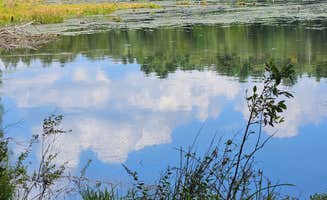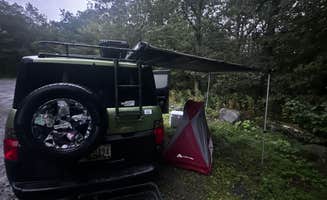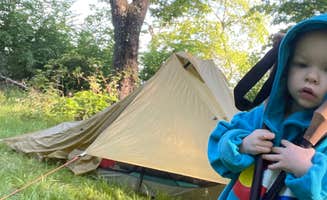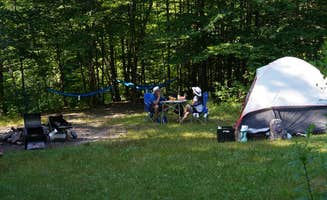Rustic camping near Beach Lake, Pennsylvania presents varied terrain options for primitive camping within the Catskills and Delaware River region. Most sites sit at elevations between 800-1,600 feet, with summer temperatures averaging 75°F daytime and 55°F overnight. Winter conditions bring significant snowfall that transforms access routes and requires specialized preparation for cold-weather camping.
What to do
Riverside hiking trails: The Denning Trailhead Peekamoose area offers excellent access to mountain trails with camping spots approximately 1.5 miles from the trailhead. According to Ali B., these sites provide "great spots right by the river" that serve as "a great spot to camp and then wake up to hike to tabletop/peekamoose mountain."
Mountain wildlife viewing: Thunder Swamp Trailhead serves as a convenient base for exploring local wildlife habitats. As Jason R. notes, "Trailhead parking was chill for a night. No trouble. Tons of hiking. Went down Saw Creek trail to a marsh."
Backpacking excursions: For serious hikers seeking overnight options along the Appalachian Trail, designated backpacker sites provide convenient stopping points. Katharine T. found these sites offer a "perfect balance of community and space" during her section hike through the Delaware Water Gap, noting they're "well maintained with bear boxes provided."
What campers like
Hammock-friendly forests: Many dispersed sites throughout the region feature mature trees ideal for hammock camping. The Appalachian Trail Designated Backpacker Campsite 2 receives praise from Katharine T. who mentions "good trees for hammocking" and notes that despite no shelter, "there's plenty of space."
Quiet lakeside settings: Hickok Brook offers secluded tent sites adjacent to water. Gregg T. describes it as "a nice quiet place" but cautions about limited space, noting "there are only 3 spots where we are. No motor vehicles beyond where I'm camping."
Bear safety infrastructure: Several camping areas maintain bear boxes for food storage, particularly important in this wildlife-rich region. Appalachian Trail sites provide these safety features, which Katharine T. specifically mentions as part of the "well-maintained" camping environment.
What you should know
Limited water sources: Plan water supplies carefully as many sites lack reliable sources. At the Appalachian Trail Designated Backpacker Campsite 2, Renee Z. advises campers to "stock up on water at Dunnfield creek natural area, or wait until Sunfish pond."
Vehicle access challenges: Many roads to dispersed sites become impassable during certain seasons or require specific vehicle types. Beals Pond State Forest experiences significant winter access limitations, with Joshua M. reporting the area is "beautiful but not easily accessible in the winter. After a certain point, the road is not maintained."
Permit requirements: New York State forest lands typically require camping permits obtainable through county ranger offices. At Hickok Brook, Gregg T. learned this requirement firsthand, noting "Where I originally camped was not a spot, according to Ranger. Had to move next to the lake. Need a permit on NY state land."
Tips for camping with families
Prepare for slope challenges: Family tent camping requires careful site selection as many areas feature uneven terrain. Renee Z. found the Appalachian Trail campsite to be "a little on the small and sloped side for tent camping," suggesting hammocks as an alternative for comfort.
Communication planning: Cell service is unreliable or nonexistent throughout much of the camping area. Joshua M. reported at Beals Pond State Forest he "was unable to get cell reception with Verizon," highlighting the importance of pre-trip communication planning.
Distance considerations: With children, carefully evaluate hiking distances to primitive sites. The Denning Trailhead area requires approximately a "1.5 mile hike in," according to Ali B., making it manageable for families with older children but potentially challenging for those with very young ones.
Tips from RVers
High-clearance vehicles only: Many forest access roads feature challenging conditions unsuitable for standard vehicles or RVs. Corey at Hickok Brook experienced this firsthand: "The road is very rough with huge potholes so good clearance is a must. It's not a good spot for car camping."
Primitive parking options: Some trailheads offer overnight parking suitable for small campers or vans. Benjamin H. describes Thunder Swamp Trailhead as "a gravel parking lot. Plenty of shade. No one bothered me," making it suitable for self-contained vehicles.
Supply planning: Most dispersed camping areas lack services or supply points. Gregg T. advises Hickok Brook campers to "bring everything with you. It's a hike back to town," noting "there is a small town 10 minutes away. Eldred, NY" for emergency supplies.





